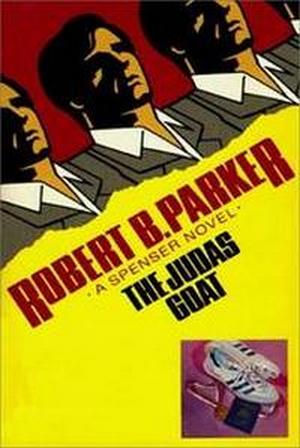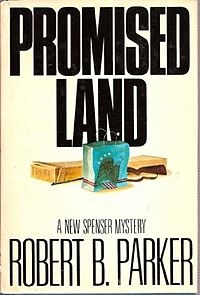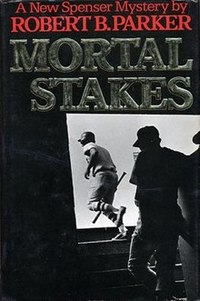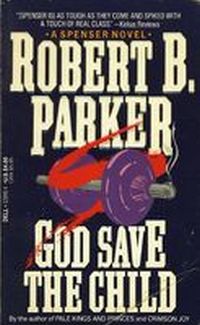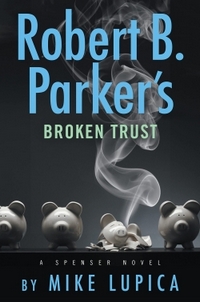 Robert B. Parker’s Broken Trust
Robert B. Parker’s Broken Trust
by Mike Lupica
DETAILS: Series: Spenser, #51 Publisher: G.P. Putnam's Sons Publication Date: November 28, 2023 Format: Hardcover Length: 382 pg. Read Date: November 30-December 2, 2023

We sat there in silence for a few moments, as if each of us were waiting for the other to make the next move. It often went this way with potential clients, like an awkward first date, and just how much they wanted to drop their guard.
“So how can I help you, Mrs. Crain?”
“Please. Laura.”
“So how can I help you, Laura.”
Her blue eyes were so pale as to be as clear as glass.
“That’s the thing,” she said. “You probably can’t.”
What’s Broken Trust About?
From that promising start, Laura Crain—the wife of the US’s 6th richest man—asks Spenser to help. Her husband has been acting strangely, and neither Laura nor his business partner can understand why. Their company is on the verge of completing a merger that will make them richer yet and will secure the company’s place in the electric car market.
The richer part isn’t that important—outside of the increasing opportunities for the very philanthropic couple to give even more money to causes. But strengthening the company to keep doing what it’s been doing is important to the Crains—they’re committed to this kind of environmentally friendly industry.
Spenser has a hard time starting his investigation because it’s such a vague target—maybe he can’t help her after all, but something about Laura Crain makes him want to try. He’s (reportedly, although some downplay this) almost paranoid, having outbursts—one nearly violent one is witnessed by Spenser—and his volatility puts many things at risk.
Then someone tied to the company is murdered. Spenser is threatened. Not long after that, someone else dies, too (probably another murder, even if it’s initially unclear). And now Spenser has a bigger mess to look into, assuming he can keep everyone else connected to the case safe and the target off his back.
The Obligatory Street-Cred Establishment
Each time a new author takes the reins of a Parker series, their first book is full of them establishing their bona fides when it comes to the series. They have to show that they understand the protagonist, the supporting characters, and the history of the series through references to past cases, quick/extended appearances of various supporting characters, etc. And Lupica goes above and beyond with these—almost all of them feeling like they were apropos in the moment, thankfully. I started to keep a mental list of his efforts, then I switched to writing them down when the list got long enough—then I abandoned it because I had better things to pay attention to and it was getting too long to print here.
The punchline? The dude knows his stuff and can show it off.
He even brings in a connection to Gino Fish. Given how long Gino’s been dead, that was nice. And, as difficult as it might be to justify returning to that connection, I’d enjoy Lupica finding a way to do it. I really enjoyed that particular character.
Now, I didn’t think that Sunny Randall’s quick appearance was necessary—nor do I think Richie Burke added much. But I liked how the latter was used (which may contradict what I just said about him), and it was a clever thing to do.
Martin Quirk
Martin Quirk gets a couple of good scenes here and his presence is felt outside of them, too—Belson brings him up a few times, which helps—but Quirk casts enough of a shadow it wasn’t that necessary. Part of that is due to the whole cred establishment, but not all of it, I don’t think. It also fits pretty well with this book—and you’d expect someone with his rank to be getting involved given the prominence of the people involved in these murders.
Beyond that, however, if Lupica wasn’t planting seeds for something major on the Quirk-front in the next book or two, then he faked me out pretty well. I hope he didn’t because I’m pretty curious about it—we haven’t gotten a lot of good Quirk material in a long time (since he got Spenser out of that southern jail cell back in the 90s, maybe?).
Mike Lupica
And what’s going on with Quirk is just one of the moves Lupica is making to put his own stamp on this series. And that’s one of the things I really appreciate about both the Publisher/the Estate’s handling of these authors taking over—they allow them to make changes to the characters. I’d absolutely understand if they had to keep the characters in some sort of stasis from how Parker had left them, like an ’80s TV drama or something.
I’m holding off forming an impression about what Lupica is doing with some of the characters at this point, I need to see it worked out a little more. But I do appreciate him taking ownership and making the moves.
I’ll be frank—I thought he did okay with the Sunny Randall books (the series I have the least attachment to, so I didn’t care too much how he did), and while I thought he was a step down from Coleman, he’s doing okay with the Jesse Stone books. But giving him the keys to the Ferrari of Parker’s series? That seemed like a dangerous move.
However, I think of all his Parker-verse work, this was the strongest. He rose to the occasion, and I’m greatly relieved. I hope he can continue it.
So, what did I think about Broken Trust?
He looked around. “We looking fo anything in particular?” Hawk said.
“What we’re always looking for,” I said. “Something that will make us feel smart when we find it.”
“Could be here awhile,” he said.
One of my favorite parts about almost every Spenser novel is the initial conversation between Spenser and the client. Lupica nailed it, I thought. After that strong start, things kept rolling at or near that level for just about the rest of the book.
It wasn’t perfect, by any means, but it was quite good. For example, some of the Hawk-Spenser banter is a little jokier than usual—Hawk, in particular, seems a little looser as he teases Spenser over a handful of things. It’s subtle, but it’s there. I enjoyed it—maybe too much—but I think Lupica could dial back Hawk a notch or two.
To be a little more pointed: the last page (or so) of Chapter Eighty-Three, all of Chapter Eighty-Four, and the last half of Chapter Eighty-Five (which, sadly is the last half chapter of the book) were let-downs. If you took the first half of Eighty-Five and put it earlier and made Eighty-Tree/the novel end with the conversation in Spenser’s office, I’d have been more satisfied. I can’t remember when I’ve been so specific about this kind of thing (not a habit I’m inclined to get into, either)—but that probably says how much it rankled me. I probably would’ve given the book another half-star (at least) without these pages.
Lupica did a good job with Susan—a character that can frequently be divisive, but he dealt with her well (and the conversations with her about the case didn’t drag the book down). Other than Hawk’s teasing, I thought he did a great job with Hawk and the other returning characters*.
* He did brush off one of the more tantalizing things that Atkins left for him regarding Hawk in less than a sentence, however. I think that was a mistake, but I get it, too.
As for Spenser himself? I give Lupica high marks—both for keeping Spenser vulnerable, fallible, and human while seemingly superhuman at times. There’s a point where Spenser wonders if he’s invented a red herring for himself on one line of inquiry, which was a nice touch. Spenser takes probably the least likely punch he’s received in the series to date—and I believed it (and quite enjoyed the fallout). Basically, he treated the character with the respect due, and I suspect that comes from a fellow fan’s heart.
I really liked the case—and the turns it took. I do wonder if Lupica wrote himself into a little corner and had to use a deus ex machina to get him out of it in the latter chapters. It worked well enough that I’m not complaining—nor am I wholly convinced that’s what happened. It just seems like one (which is bad enough). But the layers to the case, the motives of the potential suspects, how everything played out in the end, and the secrets that came to light (and how they came to light) were really well handled and worthy of Parker at his best.
Color me satisfied with this one, and my trust in Lupica strengthened. I think this would be a decent jumping-on point for someone curious about the character—or the idea of an aging PI still plugging away at things. Check this one out.

This post contains an affiliate link. If you purchase from it, I will get a small commission at no additional cost to you. As always, the opinions expressed are my own.
![]()



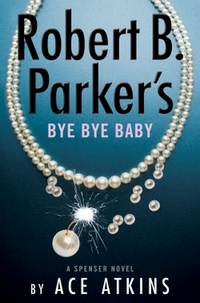


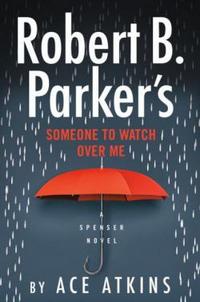

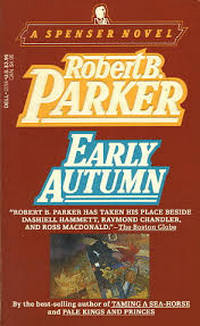
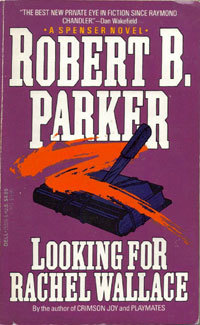
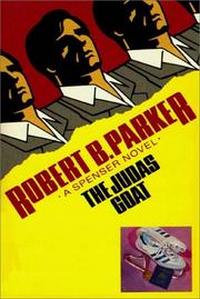

 Grab a book, any book.
Grab a book, any book.